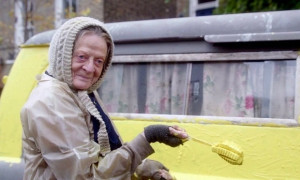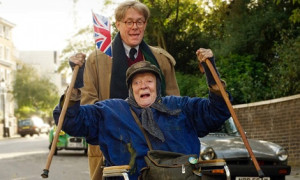 It has been a tumultuous five weeks for the film industry since the announcement of the Academy Award nominations back in mid-January. There has been widespread criticism of the glaring lack of diversity within the industry, and frankly, it is high-time that this issue is addressed. While much of the criticism concerns race and gender, it is also important to note that there is an entire population that is greatly underrepresented in film, and that group includes anyone whose faces and bodies bear evidence of time’s passing.
It has been a tumultuous five weeks for the film industry since the announcement of the Academy Award nominations back in mid-January. There has been widespread criticism of the glaring lack of diversity within the industry, and frankly, it is high-time that this issue is addressed. While much of the criticism concerns race and gender, it is also important to note that there is an entire population that is greatly underrepresented in film, and that group includes anyone whose faces and bodies bear evidence of time’s passing.
It is refreshing to see Nicholas Hytner’s The Lady in the Van, a film that focuses on the elderly Miss Shepherd, played by the supremely talented Maggie Smith, who is also part of another invisible group: the homeless.
The film opens with a black screen and the sound of a violent traffic accident. The audience never sees who the victim is but what we do eventually see is a very shaken Miss Shepherd. She is driving a dilapidated van with a cracked and bloodied windshield, attempting to outrun the police. We can assume that she has just seriously maimed or killed a person and has now fled the scene of the accident. But, as in real life, looks can be deceiving.
The film is an adaptation of Alan Bennett’s 1999 play of the same name which chronicles his real-life experiences with Miss Shepherd, an impoverished transient woman who lived in a van parked in his driveway for fifteen years.
Miss Shepherd enters Bennett’s life with the purchase of his home in Camden, one of London’s many boroughs. When he arrives, Miss Shepherd is well-known by the neighborhood’s residents as a difficult, often unruly, and unfriendly homeless woman who was in the habit of parking her shabby van in front of one home or another.

In the film no one really knows Miss Shepherd’s true story – where she’s from, does she have family, how did she get to this point in her life where she is reduced to living in a van? Parts of her story are slowly revealed through flashbacks, bits of conversations, and actions which reveal her quirks and sensitivities. But we, like Bennett and his neighbors, never fully know her and that is the way she wants it.
But, we do get to see small acts of kindness and compassion toward a person who belongs to the literally untouchable class. As a homeless person, Miss Shepherd is filthy, rank smelling, gruff, ungrateful, and unpredictable. Everyone, even Bennett, who develops a kind of friendship with her over the years, is reluctant to touch her or come too close to her. It is easier to stay away from people like her, not just because of the grime and odor, but because of the fear that the circumstances of their fate may be contagious.
The film is based on Bennett’s own life and its tagline announces, “It’s a mostly true story.” Alex Jennings does a superb job in his portrayal of Bennett. This role is complicated by the portrayal of two different Bennetts within his home. One represents the real Bennett but the other is Bennett’s alter ego, a playwright. This clever device serves as a visible representation of the conversation that Bennett has with himself.

Smith’s portrayal of Miss Shepherd seems almost tailor made for her which makes sense because she has played this role many times before in the play version. As usual, she is perfect in her portrayal, embracing all of her character’s idiosyncrasies yet still charming us with that particular look she has that completely endears her to us. Jim Broadbent, who is always reliable in any part he takes on, plays a smarmy character who pays unwanted visits to Miss Shepherd. Who he is and what he is doing, is added to the other questions we have about Miss Shepherd’s life.
We must wait until the last part of the film to get answers to our questions, but more important are the questions we ask ourselves while watching the film. What would we do if confronted with a person like Miss Shepherd? Would we treat her as a human being or would we dehumanize her? Would we be willing to look out for her or would we think that she’s someone else’s problem?

Although the film is slow moving at times, it is quite funny at times. I cherished the scenes where Miss Shepherd is treated not as a pariah but as a person. Above all, this is a film that should be seen. Alan Bennett, the screenwriter, not the character, said, “Miss Shepherd…was difficult and eccentric but above all she was poor. And these days particularly the poor don’t get much of a look in. Poverty is a moral failing today…If the film has a point, it’s about fairness and tolerance and however grudgingly helping the less fortunate.” In a social climate that celebrates coarseness, vulgarity, and narcissism, isn’t it time we have films that show humanity’s better qualities?
The Lady in the Van
Director: Nicholas Hytner
Starring: Maggie Smith, Alex Jennings, Jim Broadbent
Run time: 1 hr 44 min
Rated: Rated PG-13 for a brief unsettling image
See upcoming showtimes for The Lady in the Van here.




